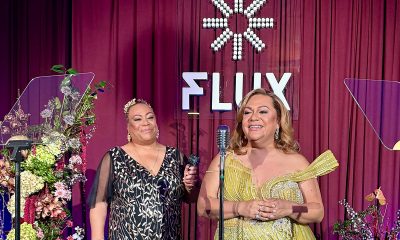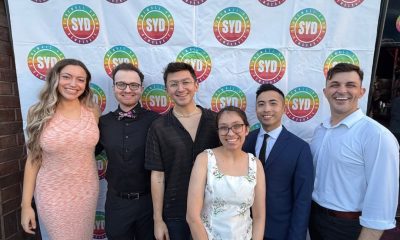West Hollywood
West Hollywood in brief- City government in action this week
City swear-In Sepi Shyne as Mayor & John M. Erickson as Mayor Pro Tempore, Fire Safety in Holiday Season, End-of-Year Trash & Recycling Info
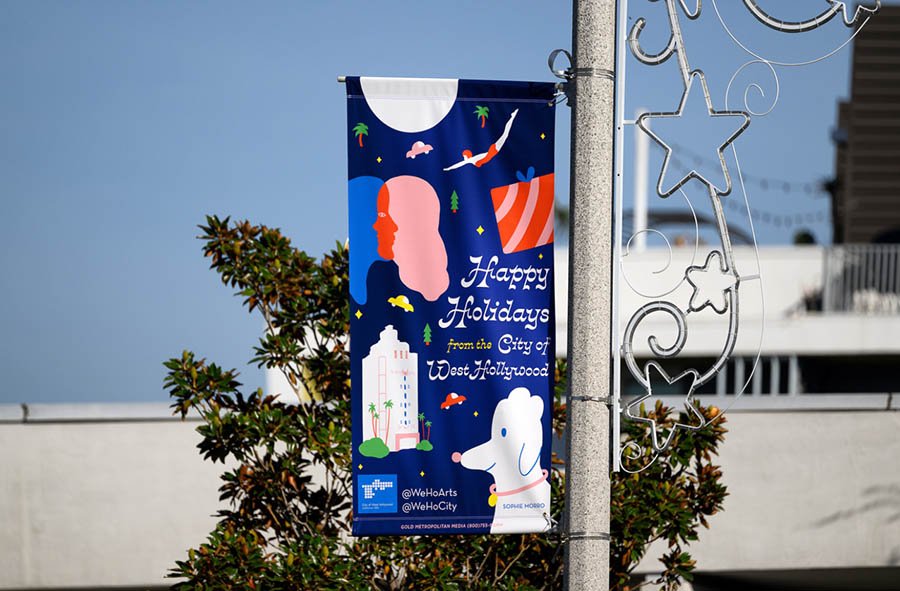
City of West Hollywood to Swear-In Sepi Shyne as Mayor and John M. Erickson as Mayor Pro Tempore on January 9
WEST HOLLYWOOD – At its regular meeting on Monday, December 19, 2022, the City Council of the City of West Hollywood voted upon selection of the City’s next Mayor and Mayor Pro Tempore: Sepi Shyne will become the next Mayor and John M. Erickson will become the next Mayor Pro Tempore.
Incoming Mayor Shyne and Incoming Mayor Pro Tempore Erickson will be sworn-in at the City of West Hollywood’s annual City Council Reorganization and Installation meeting and oath of office ceremony, which will take place on Monday, January 9, 2023 at 6 p.m. at the City’s Council Chambers/Public Meeting Room, located at 625 N. San Vicente Boulevard. A reception will immediately follow at the Pacific Design Center, located at 8687 Melrose Avenue.
The meeting, ceremony, and reception are free and open to the public. Limited validated parking will be available at the West Hollywood Park five-story structure; additional validated overflow parking will be available at the Pacific Design Center.
The meeting and ceremony will be live-broadcast and streamed as part of the regular City Council meeting and will be available by tuning into Channel 10 on Spectrum within West Hollywood, by visiting the City of West Hollywood’s website at www.weho.org/wehotv, or by visiting the City’s WeHoTV YouTube Channel at www.youtube.com/wehotv. In addition, City Council meetings can also be viewed on Amazon Fire TV, Android TV, Apple TV, and Roku streaming platforms by searching “WeHoTV” within the search functions of these services.
About Incoming Mayor Sepi Shyne – Sepi Shyne made history in November 2020 when she was elected to the West Hollywood City Council. She became the first out LGBTQ Iranian elected anywhere globally and locally became the first woman of color elected to the West Hollywood City Council. Her election also ushered in West Hollywood’s first female-majority City Council. Shyne’s priorities include advocating for affordable housing, protecting renters and social service programs, social justice, small business revival, and bringing the people’s voices to West Hollywood City Hall.
Shyne received her Bachelor of Science from San Jose State University with a double concentration in Accounting and Management Information Systems and a Minor in Drama with an emphasis in Directing. She received her Juris Doctorate with a specialization certificate in litigation from Golden Gate University School of Law in San Francisco.
As an LGBTQ+ and civil rights leader for more than 20 years, her leadership has helped secure equal rights for all. Before her election to the West Hollywood City Council, Shyne served on the City of West Hollywood’s Lesbian and Gay Advisory Board (now LGBTQ+ Advisory Board), on the City of West Hollywood’s Business License Commission, and on the Los Angeles County Assessor’s Advisory Council, on which she continues to serve. Additionally, she has led many boards and organizations, including the LGBT Bar Association of Los Angeles and as a Board of Governor and Steering Committee leader with the Human Rights Campaign Los Angeles.
Shyne is a Co-Organizer of WeHo Neighbors Helping Neighbors, a community group created during the pandemic to help get resources to seniors, people with disabilities, and people in immunosuppressed households via social media and volunteer check-in calls. In every board and organization she has led, she has recruited and elevated women and people of color to leadership positions to create more diversity, inclusion, and equity.
About Incoming Mayor Pro Tempore John M. Erickson – John M. Erickson was elected to the West Hollywood City Council on November 3, 2020 with the commitment to uphold the city’s founding vision for a forward-thinking, diverse, and tolerant community.
Erickson first planted roots in West Hollywood in 2010 when he was selected to intern for the West Hollywood City Council. The internship set him on a path that connected his work for social and economic justice with his passion for public service. He went on to become Council Deputy to former Mayor Abbe Land and then served as a staff member at West Hollywood City Hall working to advance policies, initiate programs, and increase awareness around LGBTQ+ rights, women’s rights, the environment, and civic engagement.
After leaving City Hall, Erickson served as a Legislative Representative at LAX (Los Angeles International Airport) and is currently the Interim Vice President of Public Affairs, Communications, and Marketing at Planned Parenthood Los Angeles.
The immediate past Vice Chair of the City’s Planning Commission, Erickson’s priorities on the City Council include overcoming COVID-19 through sensible health practices and economic recovery; creating more affordable housing and protecting renters’ rights; reducing traffic through alternative transportation strategies, fighting climate change and making our city more sustainable; and implementing policies that make the city truly free of prejudice and welcoming to all.
Erickson has earned a reputation as a fearless, tenacious, and effective voice for those who need one. His advocacy work includes serving as a National Board Member of the National Organization for Women and President of the ACLU Southern California. In 2017, he became Governor Brown’s appointee to the California Commission on the Status of Women and Girls and served as an organizer for both the Resist March and the historic Women’s March Los Angeles. He serves on the Board of the Women’s March Los Angeles Foundation. Erickson was part of the End Statute of Limitation on Rape (ERSOL) Campaign, which overturned California’s statute of limitations on rape and sexual assault in 2016.
Erickson received his Ph.D. in American Religious History from Claremont Graduate University and a Dual-Master’s Degree from Claremont Graduate University. He graduated from the University of Wisconsin Oshkosh with a B.A. in English and Women’s Studies.
Parisa Parnian was selected by Incoming Mayor Sepi Shyne to provide an original artwork for the City of West Hollywood’s 2023 City Council Reorganization and Installation event invitation. Artist Statement: “The Phoenix bird represents Incoming Mayor Sepi Shyne both as a symbol of her ‘rising out of the ashes’ and taking flight, as well as a nod to her Iranian heritage: the Phoenix bird is part of Persian mythology. The background of sparkly palm trees silhouetted by the sun references the iconic West Hollywood skyline. And the collective of raised fists represents not only the City of West Hollywood’s history of inclusivity and progressiveness, but also Incoming Mayor Shyne’s commitment to equity and advocacy for the community she serves.”
City Swears-In Three Newly Elected Members to the West Hollywood City Council
The City of West Hollywood has sworn-in three newly elected members to the West Hollywood City Council: Lauren Meister, Chelsea Lee Byers, and John Heilman. Each Councilmember took an oath of office during the regular meeting of the City Council of the City of West Hollywood on Monday, December 19, 2022. The meeting is available for viewing on the City’s website at www.weho.org/wehotv and on the City’s YouTube channel at www.youtube.com/wehotv.
During the meeting, the City Council voted upon selection of the City of West Hollywood’s next Mayor and Mayor Pro Tempore: Sepi Shyne will become the next Mayor and John M. Erickson will become the next Mayor Pro Tempore. They will each take an oath of office at the City’s City Council Reorganization and Installation meeting and ceremony on Monday, January 9, 2023 at 6 p.m.
About Lauren Meister – After nearly two decades as a neighborhood advocate, Lauren Meister was elected to the West Hollywood City Council on March 3, 2015; re-elected for her second term on March 5, 2019; and re-elected for her third term on November 8, 2022. She is the City of West Hollywood’s current outgoing Mayor.
Since being elected, Meister has worked on initiatives to strengthen the Rent Stabilization Ordinance, develop more neighborhood-friendly planning and land use policies, provide social services for people who are homeless, create a Small Business Task Force, establish West Hollywood as a safe haven for LGBTQ asylum seekers, increase community engagement and transparency, implement a Public Access Defibrillation (PAD) Program, educate the public on safety issues related to children and pets, embrace and promote our historic resources and, raise the bar on design standards, environmental programs, and sustainability.
In her first term as mayor (April 2016-May 2017), she joined with mayors from across the nation to show support for preserving the Affordable Care Act (ACA) and protecting immigrant and refugee communities.
Among Meister’s priorities are:
- Initiating and supporting policies to save our affordable housing stock and local neighborhood serving businesses;
- Prioritizing public safety, social services, and housing production to reflect the needs of our community;
- Preserving our city’s rich history and unique character;
- Protecting and enhancing parks and green space; and
- Advocating for safe mobility options and fair parking policies.
Prior to her election in 2015, Meister became involved with the City of West Hollywood as a neighborhood watch captain, took the LASD Community Emergency Response Team “CERT” training, and attended the West Hollywood Sheriff’s Community Academy. She went on to lead the largest neighborhood association in the city, representing residents on issues such as public safety, traffic circulation, parking, and development.
She served on numerous commissions and committees for the City of West Hollywood, including the Planning Commission and Public Safety Commission. She worked to mitigate traffic and parking impacts of new and proposed projects in the City, supported creative parking solutions to help neighborhood businesses, initiated the City’s “Live, Work, Play, Be Safe” educational campaign, and supported new ideas to increase pedestrian and bicycle safety. She also worked on campaign finance reform and has been a strong advocate for a stricter code of ethics.
At the request of former Congressmember Henry Waxman, Meister testified before Congress in support of health insurance regulation and universal health care, and she worked with City of Los Angeles Councilmember Paul Koretz to reduce helicopter noise in residential neighborhoods.
In 2013, she served as Chair of the successful “Yes on Measure C” Term Limits for West Hollywood committee, limiting all Council members elected on or after March 2013 to no more than three full or partial terms on the City Council.
Professionally, Meister is the sole proprietor of her own marketing research firm based in West Hollywood. She has a bachelor’s degree in Sociology, a Graduate Certificate in Public Administration, and a master’s degree in Public Administration with a concentration in Emergency Services Management.
A resident of West Hollywood for more than 30 years, Meister has been both a renter and a homeowner in the City. Her parents, sister, and rescue dogs, Suki and Sammy, also call West Hollywood home.
About Chelsea Lee Byers – Chelsea Lee Byers was elected to the West Hollywood City Council on November 8, 2022. Byers first became connected to the City of West Hollywood through the Women’s Leadership Conference. This connection led to many program partnerships with the City, including Women Manifest (2016), the Cannabis Education Forum (2015-2018), collaborative film screenings, panels, and more.
While working with United Way’s Everyone In campaign, Byers engaged with the City’s Social Services Division and Strategic Initiatives Division to bring educational programming to the community on homelessness and housing solutions. She currently works as Director of Programs and Partnership with Women’s Voices Now and is a core team member with Beautiful Trouble.
The immediate past Vice Chair of the City’s Human Services Commission, Byers’ priorities on the City Council include social service delivery, climate-change mitigation strategies, and emergency resiliency efforts, creating more affordable housing and resources for renters, enhancing the streetscape for improved pedestrian and cycling experiences while reducing vehicle-dependency, and community building and policy implementation to ensure West Hollywood is an inclusive community for all.
She serves on the Board of Directors for National Women’s Political Caucus as the Vice President of Education and Training for NWPC California. She is a board member of Abundant Housing Los Angeles and President Emeritus of the Westside Young Democrats.
Byers has participated in a number of fellowships including the Housing Policy Leadership Institute, New Leaders Council, Art for LA Activate Program, National Council for Jewish Women’s Advocacy Program, and the James Lawson Institute.
Byers studied at Universidad Internacional Cuernavaca, Franklin University Switzerland and received her B.A. in Political Science and Women’s Studies from Northern Arizona University.
About John Heilman – John Heilman was active in the incorporation of the City of West Hollywood. He was elected to the City’s first City Council in November 1984. He was chosen as the City’s second Mayor in 1985. He also served as Mayor in 1990, 1995, 1999, 2001, 2006, and 2010. He was re-elected to the City Council in June 2015 and in November 2022 and is one of the longest-serving openly gay elected officials in the United States.
Since his earliest days on the City Council, one of Heilman’s strongest concerns has been affordable housing. He was instrumental in the establishment of the West Hollywood Community Housing Corporation, a City-funded organization that develops affordable housing in West Hollywood and the surrounding region. He also helped develop the City’s landmark Rent Stabilization Ordinance. He helped create the City’s inclusionary housing policy, which requires developers of new residential buildings to include housing for low and moderate-income residents.
Heilman drafted the City’s landmark ordinance prohibiting discrimination on the basis of HIV and AIDS. He received the U.S. Conference of Mayors’ Award for his leadership on the issue of AIDS. He established the City’s Senior Advisory Board and helped develop the City’s Comprehensive Services Center at Plummer Park. He also established the City’s Russian Advisory Board in an effort to integrate the City’s Russian-speaking residents into the City’s decision-making process, and he founded the City’s Annual Women’s Leadership Conference.
Heilman was instrumental in building West Hollywood Library, which was opened in 2011.
Heilman has worked closely with the West Hollywood business community. He was a founder of the West Hollywood Marketing and Visitors’ Bureau now known as the West Hollywood Travel + Tourism Board/Visit West Hollywood. He helped establish the Sunset Strip Business Improvement District as well as the business improvement district which serves the City’s Design District.
In his professional life, Heilman is a highly regarded law school professor. He is a professor at Southwestern Law School and an adjunct professor at USC Law School. In his private life, Heilman is an avid runner. He has run numerous marathons and half-marathons for charity.
About the City of West Hollywood – The City of West Hollywood is like no other city in the world. Located in the heart of metropolitan Los Angeles, the City was incorporated in 1984 by a unique collaboration of people including LGBTQ activists, seniors, and advocates for affordable housing. At only 1.9 square miles, West Hollywood is a robust economic and cultural center instilled with idealism, creativity, and innovation. A spirit of community activism and civic pride thrives in West Hollywood for many of its approximately 35,000 residents and the City has a strong progressive political voice.
West Hollywood works diligently to defend the fundamental rights of its community members including LGBTQ people, people with disabilities, seniors, people of color, immigrants, women, and others. The City is one of the most outspoken advocates anywhere for the legal rights of LGBTQ people; more than 40 percent of residents in West Hollywood identify as LGBTQ. The City also prides itself on being a safe space. Regardless of nationality or immigration status, the City of West Hollywood has a commitment to promoting social justice and equal rights.
West Hollywood to Ring in the New Year with Drug- and Alcohol-Free Event: VIBEZ: A Sober New Year Celebration
This New Year’s Eve, join in the fun and celebrate the first moments of 2023 at VIBEZ: A Sober New Year Celebration, West Hollywood’s premier alcohol- and drug-free New Year’s Eve event. This year’s celebration will bring hundreds of people together for a fabulous celebration and an alcohol-free midnight toast. The theme of this year’s event is “Astrological Wellness” and there will be drag entertainment, dancing, and light refreshments as well as other fun wellness activities such as tarot and palm readings, psychics, star charting and more! The event will provide a safe space for sober people to celebrate New Year’s Eve with others in recovery, away from the typical substance-heavy events and parties that mark the holiday.
The City of West Hollywood has co-sponsored a New Year’s Eve event since 2014. VIBEZ is organized by the nonprofit organization, The Phoenix, and will take place on the evening of Saturday, December 31, 2022, starting at 9 p.m. and will run until 1 a.m. on Sunday, January 1, 2023 at Plummer Park’s Fiesta Hall, located at 1200 N. Vista Street. There will be an All Recovery Meeting at 8 p.m. followed by the New Year’s Eve celebration starting at 9 p.m.
VIBEZ is a free event. Attendees must be 18 or older to attend. Advance RSVP is encouraged, as Plummer Park’s Fiesta Hall has limited capacity. RSVP at https://tinyurl.com/2hvdd4cc. Attendees are encouraged to be respectful of the neighboring residential area when arriving and leaving the event. Limited parking is available in both the north (N. Vista Avenue entrance near Fountain Avenue) and south (Santa Monica Boulevard entrance) parking lots at Plummer Park.
For additional information about VIBEZ: A Sober New Year Celebration, please contact Andy Short at [email protected].
End-of-Year Trash and Recycling Information
The City’s solid waste hauler, Athens Services, will not pick up of trash on Christmas Day, Sunday, December 25, 2022 or on New Year’s Day, Sunday, January 1, 2023. Sites that receive Sunday service will not be served. Service will resume on Monday, December 26, 2022.
Holiday trees are 100% recyclable. Athens Services will collect holiday trees on normal pickup days beginning on Monday, December 26, 2022 through Friday, January 6, 2023.
Tips to ensure collection of holiday tree: remove stands, ornaments, lights and tinsel; place holiday trees at the curb; trees over six feet in length must be cut in half; trees with flocking or fire retardants are acceptable; and please do not leave the tree in a plastic bag as the bag gets caught in the chipper blades.
Remember that gift boxes, wrapping paper, and other paper packaging can be recycled with regular paper and cardboard recycling. During the holidays, many people get rid of old electronics, as well. Residents should take old electronics to a collection center such as the UCLA S.A.F.E. Drop-Off Center or schedule an E-waste pickup with Athens Services. For details, please visit www.weho.org/city-government/city-departments/public-works/environmental-services/trash-and-recycling.
Bulky or large items, such as refrigerators, carpet, and wood, can be picked up at no charge to residents, limited to one or two items. Please call Athens Services directly to find out details and arrange for a pickup.
If you will be generating a larger amount of trash than typical and when trash and recycling bins or carts are full, do not place extra trash and recycling on the ground with bins and/or carts. Please contact Athens Services to schedule extra services to accommodate extra trash and recycling.
For more information, or to arrange for extra trash and recycling services, please contact Athens Services’ Customer Service Office at (888) 336-6100.
Homeless Initiative Introduces New Mobile Health Clinic Services to the Community
The City of West Hollywood is partnering with UCLA Health Homeless Healthcare Collaborative to bring UCLA’s mobile healthcare clinic to West Hollywood on a regular basis to serve people experiencing homelessness in West Hollywood.
UCLA Health will host walk-up healthcare services on a monthly basis piloting services at West Hollywood Park on Monday, December 19, 2022 from 1 p.m. to 3 p.m. and Plummer Park on Tuesday, January 10, 2023 from 12 p.m, to 2:30 p.m. Services will be provided at no-cost by UCLA Health Homeless Healthcare Collaborative, which includes doctors and nurses. The Homeless Healthcare Collaborative mobile team provides urgent care, wound care, medical screenings, preventive care, vaccinations, care for chronic medical conditions, and referrals to social service supports that benefit community members experiencing homelessness. Additional service dates will be announced after the pilot launches.
“We deeply appreciate the partnership with UCLA Health in bringing their innovative Homeless Healthcare Collaborative to West Hollywood. Through the West Hollywood Homeless Initiative, we are working to increase access to services and support that help people on the path back into housing. Making UCLA Health services available within the City makes it easier to get healthcare. We are proud to have UCLA Health join forces with the West Hollywood Homeless Initiative,” said City of West Hollywood Mayor Lauren Meister, who is also a member of the City Council Subcommittee on Homelessness.
According to UCLA Health, the stressors and barriers people face when experiencing homelessness lead to higher rates of chronic disease, social isolation, increased morbidity and mortality, fragmented service use, and poor primary care experiences. According to UCLA Health data, 85% of emergency department visits for people experiencing homelessness are due to primary- or urgent-care conditions that can be prevented or treated in the community.
By partnering with UCLA Health Homeless Healthcare Collaborative, the City of West Hollywood is adding to existing innovative health services funded by the City’s Social Services Grants Program to meet the needs of community members experiencing homelessness. Healthcare in Action provides on-call health services in the City’s parks and public spaces and LA LGBT Center offers comprehensive, ongoing health services at their nearby clinic. The City’s collaborative partnerships with Saban Community Clinic, and Cedars-Sinai continue as well. All told, the range of health resources available through these partners, along with the capacity to meet people both in the community and serve them ongoing at local clinics, advances health equity in the West Hollywood community.
The City’s Human Services and Rent Stabilization Department’s Strategic Initiatives Division oversees the West Hollywood Homeless Initiative in coordination with the City’s Social Services Division. The Homeless Initiative is a multi-disciplinary, multi-agency collaborative response, which includes multiple City Departments, City-funded social service agencies, the West Hollywood Chamber of Commerce, and Los Angeles County agencies.
Through the West Hollywood Homeless Initiative, in partnership with the community, and with funding support from LA County Measure H, in 2018 the City established the Five Year Plan to Address Homelessness in Our Community. The plan identifies seven goals – and key actions to reach these goals – this new partnership with UCLA Health further advances Goal #6: Strengthen partnerships with other cities and with nonprofit organizations to support regional and individualized solutions to homelessness.
Making progress toward the goals of West Hollywood’s Five-Year Plan remains critically important in directing the local response to homelessness.
The West Hollywood Homeless Initiative seeks to effectively address homelessness. If you are concerned about a community member who is homeless, call the West Hollywood Homeless Initiative Concern Line at (323) 848-6590. If your concern requires time-sensitive assistance during nights or weekends, please call the West Hollywood Sheriff’s Station at (310) 855-8850.
For more information about the Homeless Initiative, please contact Elizabeth Anderson, City of West Hollywood Strategic Initiatives Program Administrator, at (323) 848-6839 or [email protected].
West Hollywood Urges Community to be Mindful of Fire Safety this Holiday Season
The City of West Hollywood is reminding the community to stay safe this winter holiday season and follow winter holiday fire and personal safety tips from the City, Federal Emergency Management Agency (FEMA), the National Fire Protection Association (NFPA), and the LA County Fire Department.
The City of West Hollywood’s Fire Safety Brochure offers the following tips and more to make your home fire-safe:
- Install smoke alarms and test smoke alarms regularly.
- Place one or more ABC rated fire extinguishers in your home.
- Consider installing automatic fire sprinklers when possible.
- Be extremely cautious using portable heaters and follow all instructions carefully.
- Never smoke in bed.
- Never leave candles burning unattended.
- Do not overload electrical outlets or power strips.
FEMA provides a number of fire safety tips and outreach materials on its website, including general tips, info on electric vehicle charging, and for space heaters:
- Keep anything that can burn, such as bedding, clothing, and curtains, at least 3 feet away from the heater.
- Make sure the heater has an automatic shut-off, so if it tips over, it shuts off.
- Turn heaters off when you go to bed or leave the room.
- Plug portable heaters directly into outlets and never into an extension cord or power strip.
- Have a qualified electrician install a new, dedicated circuit for your EV charging device. Older home wiring may not be suitable for use with EV supply equipment.
- Cover the EV charging station outlet to stop water from entering. Check the manufacturer’s guidelines to make sure it is safe to charge your EV in wet conditions.
- Keep candles at least 12 inches away from anything that burns.
- Make sure your tree is at least 3 feet away from heat sources like fireplaces, radiators, space heaters, candles, or heat vents and water your tree daily. Also, make sure your tree does not block exits.
The City of West Hollywood features tips for making your home fire-safe on the City’s website with detailed information about safety considerations and reminders to install smoke alarms and test them regularly.
The City of West Hollywood is served by the Los Angeles County Fire Department (LACoFD). As the holidays approach, LACoFD reminds community members to operate space heaters safety, to ensure there is a working carbon monoxide (CO) detector in your home, and to take precautions when using holiday decorations, lights, and candles. Stay up-to-date with information from LACoFD at https://fire.lacounty.gov and follow updates at https://twitter.com/LACOFD.
Los Angeles County has implemented a free mass notification called Alert LA County, which is used to contact residents and businesses via recorded phone messages, text messages, or e-mail messages in case of emergency. West Hollywood residents are encouraged to sign up at https://ready.lacounty.gov/alerts.
For more information about Community Safety in the City of West Hollywood, please call (323) 848-6414 or visit www.weho.org/publicsafety.
To contact Los Angeles County Fire Station No. 7, please call (310) 358-3430. To contact Los Angeles County Fire Station No. 8, please call (323) 654-5445.
For more information, please call the City of West Hollywood’s City Council Offices at (323) 848-6460. For people who are Deaf or hard of hearing, please call TTY (323) 848-6496.
For up-to-date information about City of West Hollywood news and events, follow @wehocity on social media, sign-up for news updates at www.weho.org/email, and visit the City’s calendar of meetings and events at www.weho.org/calendar.
West Hollywood
John Heilman and Danny Hang will serve as WeHo’s new Mayor and Vice Mayor
Last night, community members and local officials gathered to celebrate new leadership and bid a warm farewell to outgoing Mayor Chelsea Byers.
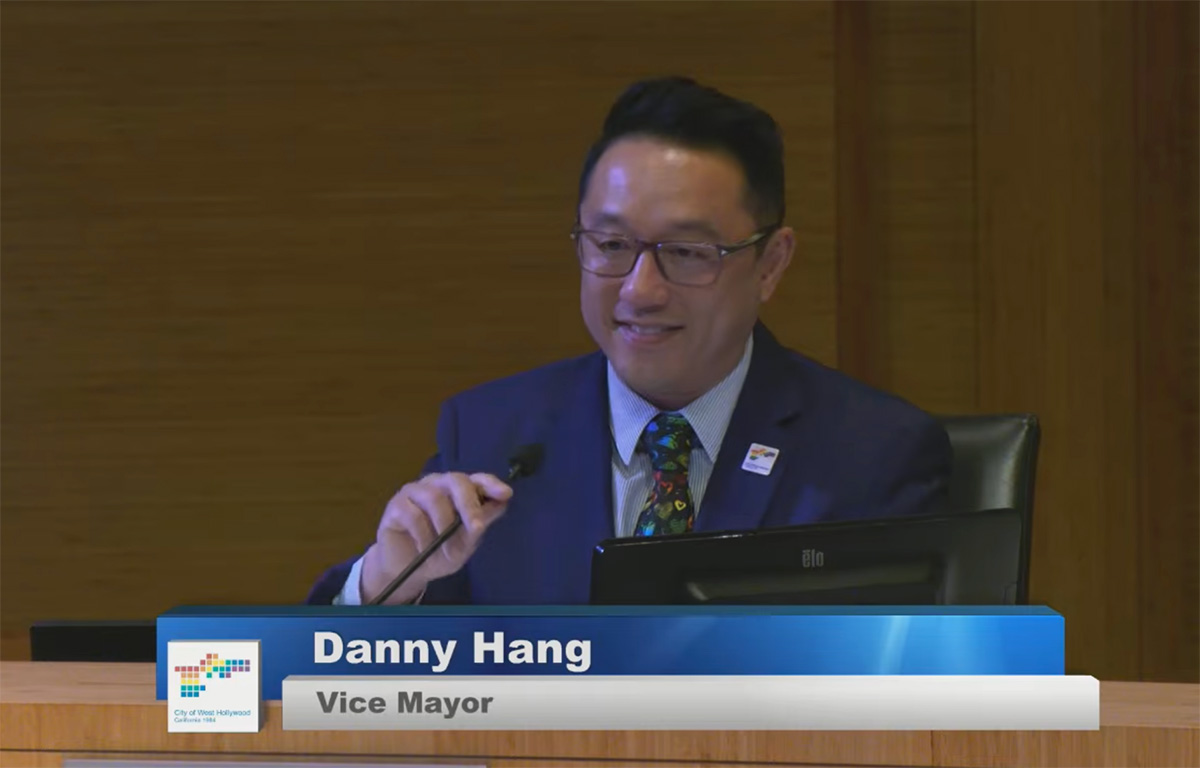
On Jan. 12, West Hollywood residents packed the City’s chambers at 6 p.m. to honor the work of outgoing mayor Chelsea Byers and witness councilmembers John Heilman and Danny Hang take their oath of office as they respectively assume their roles as Mayor and Vice Mayor for 2026.
In her last address as Mayor, Byers spoke about the optimism she holds onto in these unsteady times. To her, West Hollywood is a unique City: one that has become a model for what can be possible in an unjust society. “It’s us against the world. It’s West Hollywood on the stage,” Byers said. “It’s our story to tell, and every single person here contributes in such great ways to that.”
Byers was awarded a plaque on behalf of West Hollywood council members for her outspoken commitment to LGBTQ+ rights, economic justice, housing affordability, and policies that emphasize equity and inclusivity in West Hollywood.
Her leadership remains a bright, guiding light for Mayor Heilman, who was part of West Hollywood’s first city council after the independent city was incorporated in 1984. The spirit of that initial group remains today: queer, progressive, and led for and by the people. Yesterday’s ceremony marked the beginning of Heilman’s ninth time serving as Mayor, as well as his last year on the city council due to term limits.
Now, he leads side-by-side with a self-proclaimed “newcomer,” Danny Hang.
From the 626 to the Westside: Hang’s roots and journey
Hang was born in Monterey Park, a city in the San Gabriel Valley. The region is known for its diverse communities and AAPI-rich culture and history, and Hang recounted to the Blade the deep sense of belonging and comfort he felt growing up there. “I could go to a restaurant, speak Vietnamese or Chinese,” Hang said. “There are people who look like me out there. It is my home away from home.”
After college, he worked at the Social Security Administration, where he helped retirees, disabled people, and those impacted by loss file for Supplemental Security Income (SSI). The work was fulfilling, and he loved feeling that he had a tangible impact on others’ lives: that he could help residents grappling with difficult bureaucratic processes.
This passion grabbed the attention of L.A. County Supervisor Lindsey Horvath, who tapped Hang into serving on West Hollywood’s Disabilities Advisory Board in 2017. Hang eagerly accepted the role, having always been drawn to the vibrant, queer cultural hub. “WeHo was always the land of the unicorn: the land of magic,’ Hang told the Blade. “[This] was a town where I could be open, by myself, and find other people who were also LGBTQ+.”
After serving on the City’s Disabilities Advisory Board and, subsequently, the county’s Business License Commission, Hang noticed a lack of AAPI representation in local leadership. “There aren’t many AAPI people at all in West Hollywood. After I was on the commission, [I thought]: Hey, I think I want to run for city council,” Hang told the Blade.
Creating more inclusive leadership in WeHo
In 2024, Hang was elected to West Hollywood’s city council, becoming the first AAPI councilmember in the City’s 40 year legacy. “I want to see people who look like me in local government, because I want this community to be reflective of the modern-day people who live here. We’re a diverse community, and there’s no reason why we shouldn’t have people of color on the council, as well as more people of color appointed to our boards and commissions.”
Last night, local officials offered encouragement, support, and affirmation to Hang after he took his oath of office. “You’re already making history and certainly making waves across, not just your home region of the San Gabriel Valley, but certainly in California,” said Monterey Park councilmember Henry Lo.
Afterwards, Hang addressed the room, thanking residents, fellow council members and his family. “Standing here as the first AAPI elected to the West Hollywood City Council is deeply meaningful, and I couldn’t have done it without my parents. [They’re] right here in the front row,” Hang said. “My dad was a union worker, who showed me why standing up for workers matters. And my mom worked in a small business, owning a little nail salon in South Pasadena. She taught me what it means to care for others and to keep the community going.”
The year ahead: Heilman calls for residents to unite
Afterwards, Mayor Heilman spoke at length about the upcoming transitional year, the urgency of the current political climate, and ways that community members can step up to support each other. In his last term, he has set his eye on revitalizing the Sunset Strip, stabilizing rent and increasing housing affordability as well as examining the safety of the City’s foundational buildings, including the library and fire station.
He concluded his speech by making an unwavering stance on the “appalling” state of the federal government, stating that every West Hollywood resident must step up together in the face of ongoing federal attacks on the rights of LGBTQ+ people, specifically transgender people, as well as immigrants and other marginalized community members.
“This is a direct attack on our residents. It’s a direct attack on all of us,” Heilman said. “Now is not the time to hide. We need you…Ask what you can do to help people in the community,” he said, galvanizing residents to volunteer for the City’s various social services, nonprofits like Hollywood Food Coalition and Ascencia.
This call for unity and communal bravery echoes Byers’ belief in the courage of the people of West Hollywood. “41 years ago, a group of people defined what government could be,” Byers said. “We’re living the wildest dreams of people decades ago…and we get to be a bridge for that hope for the future. In such a critical moment, it’s truly our responsibility.”
Kristie Song is a California Local News Fellow placed with the Los Angeles Blade. The California Local News Fellowship is a state-funded initiative to support and strengthen local news reporting. Learn more about it at fellowships.journalism.berkeley.edu/cafellows.
West Hollywood
Administration refused to honor World AIDS Day; residents gathered with defiance, grief and love
Yesterday, members of the APLA Health Writers Group read moving stories to a large group of locals gathered at the AIDS monument.
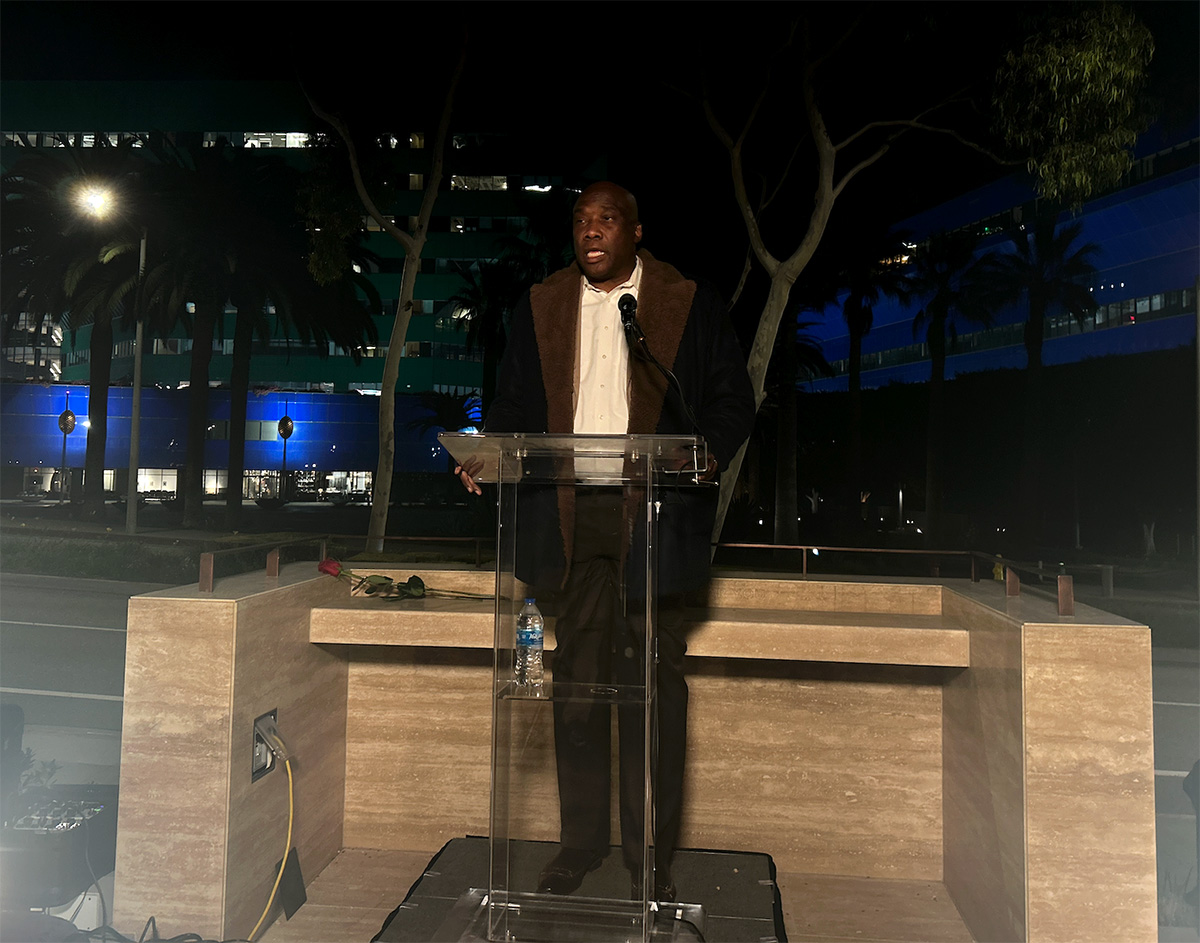
On Monday, the federal administration did not honor World AIDS Day, for the first time since the international awareness day was created in 1988. In addition to significant funding cuts to organizations focusing on HIV preventative treatment and care, the government’s halting of this commemoration perpetuates a dismissive system of inaction against LGBTQ+ people.
And yet, over 50 community members filled the empty spaces of West Hollywood’s AIDS monument yesterday evening, waiting in the night chill as city officials delivered impassioned statements and writers from APLA Health read personal pieces that centered a grief and love for those lost to the epidemic.
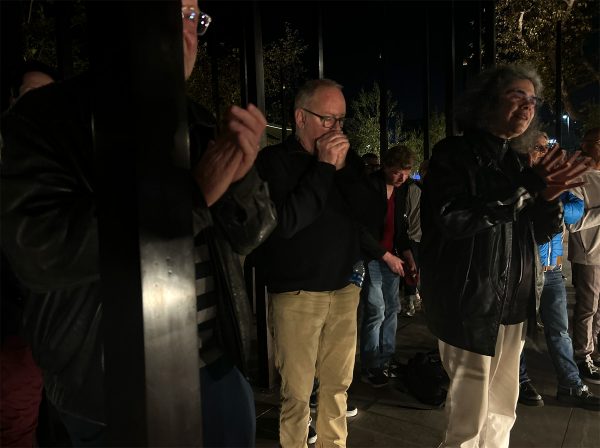
Before the readings began last night, West Hollywood vice mayor John Heilman asked for residents to join him in a righteous rage against administrative apathy. “I want to ask us all to reflect for just a moment about all of the people we lost…I want us to reflect and get angry,” said Heilman. “We have a fucking president who won’t even recognize World AIDS Day.”
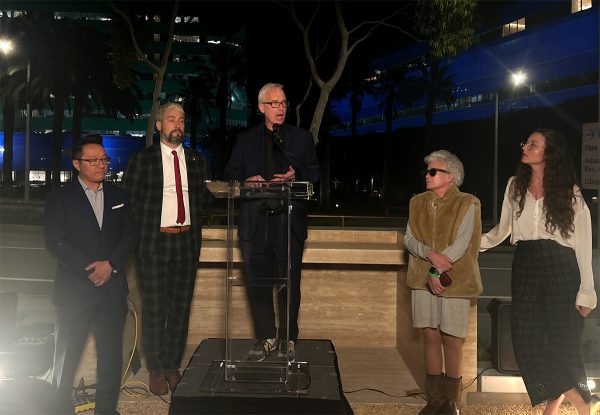
Irwin Rappaport, board chair for STORIES: the AIDS monument, echoed this immense disappointment. “Many of us here tonight lived through the 1980s, so we know what that’s like,” Rappaport said. “We also know that because of that neglect, because of that lack of caring from the federal government, we have to care for one another — and we know how to do that. When we don’t have recognition from others, we know how important it is to preserve our own history, to tell our own stories.”
Through heavy silence, five writers from APLA Health’s writers group stood tall before a podium and shared intimate writings they created about the epidemic and its personal impact on them. The collective was established in 1989 to provide an inclusive, expressive space for HIV-positive writers and allies to work on their writing and learn how to share their stories.
Writer Brian Sonia Wallace, who served as West Hollywood’s poet laureate from 2020 to 2023, has been working with the writers group for the last four years to help them hone and refine their narrative voices as they share their heaviest grief and the depths of their love for the people they lost to HIV and AIDS.
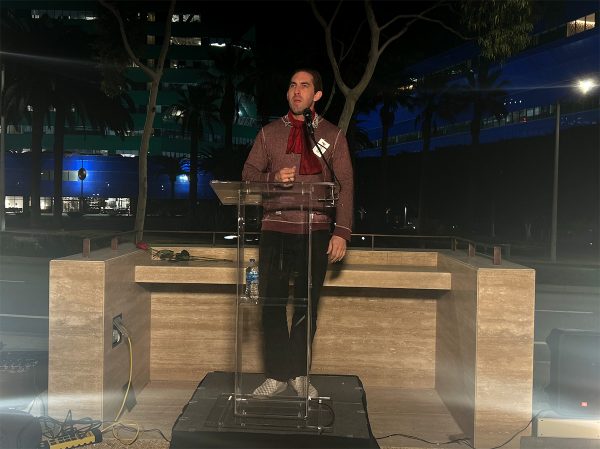
Hank Henderson, one of these writers, read from a diary entry from November 29, 1991. His voice, clear and strong, wavered as he shared about the death of his dear friend Richard. In a piece filled with lush, rich detail, painted clearly with a strong and loving voice, Henderson recounted a memory with Richard during the latter’s last years.
“The Santa Barbara sky is clear blue forever today…Yesterday came and went like a half-remembered dream between snooze alarms,” Henderson recited. “Last year, we walked to the beach. We spent hours there, played frisbee ourselves, brought the dog. Richard even yelled out 30-minute tanning turnover alarms. Yesterday, he took tiny, labored steps back to the car, used my shoulder to keep himself from falling over. Nobody said anything. We just pretend it’s normal.”
Another writer, Austin Nation, shared the story of being told he was HIV-positive at 26 years old. As a young nurse, he remembered the shock of seeing “young, beautiful men” arriving at the hospital covered in “purple, blotchy sores.” When he received his own test results, a paralyzing terror washed over his body. An incredulity followed the fear: why was this happening to him? “I got this thing for what?” Nation spoke. ”For having fun? For making love? And now it’s gonna cost me my life?”
But as he stood before the crowd, now 63 years old, he was met with applause and joy as he stated and repeated: “I’m still here. I’m still here.” The writers, in their grief and loss, have come to a place where they are able to share these stories, empowered and held. “In a world that writes off people with stories like mine,” Nation said. “It’s a hell of a good day to be alive.”
Kristie Song is a California Local News Fellow placed with the Los Angeles Blade. The California Local News Fellowship is a state-funded initiative to support and strengthen local news reporting. Learn more about it at fellowships.journalism.berkeley.edu/cafellows.
West Hollywood
West Hollywood kicks off community-focused programming for World AIDS Day
Since 1988, queer communities have come together on Dec. 1st to honor siblings and allies lost to the AIDS epidemic.
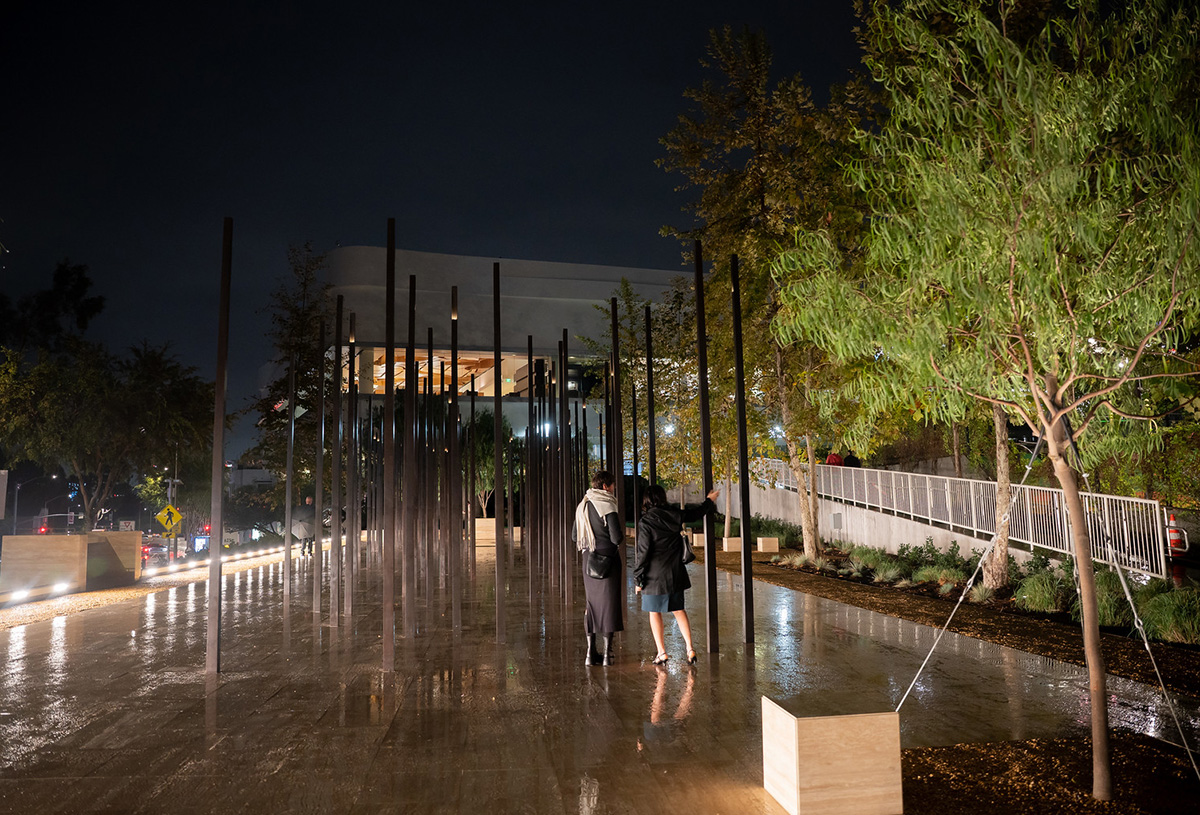
Since 1988, LGBTQ+ communities have come together on Dec. 1st to commemorate queer siblings and allies lost to the AIDS epidemic. This year’s World AIDS Day follows the theme “Overcoming disruption, transforming the AIDS response” and highlights the substantial funding cuts to research, health services, and community initiatives that have prioritized the safety of people with HIV and AIDS. The theme challenges people to think about “radical” ways to organize together and ensure that those who are impacted are able to access the care, treatment, and awareness that they need.
Beginning today, the City of West Hollywood is kicking off programming to recognize the historical transformation that local queer communities experienced during the AIDS epidemic. A panel from the AIDS Memorial Quilt will be available for viewing at the City’s Council Chambers at 625 N. San Vicente Boulevard through Monday, Dec. 15th.
Known as the largest community arts project in history, the Quilt is a powerful memorialization of loved ones who died during the epidemic. Each panel of the Quilt contains a story of remembrance, immortalizing a life cut short during the crisis. The project currently contains over 50,000 panels dedicated to over 110,000 people, all woven together in a 54-ton tapestry piece.
If you’re visiting the panel today, there will be an additional gathering opportunity tonight at the West Hollywood Park for STORIES: the AIDS Monument. From 5:30 to 8:30 p.m., members from the HIV-positive writers collective APLA Health Writers Group will present intimate readings that reflect on their experiences. Community members will be allowed time to wander through the monument and also preview the new Herb Ritts: Allies & Icons exhibition at ONE Gallery after the program. The art show includes striking black and white portraits of activists who stood in alliance with those most impacted during the AIDS epidemic.
Additionally, fresh flowers will be placed on the bronze plaques that line the City’s AIDS Memorial Walk. During the AIDS epidemic, West Hollywood was at the center of a rampant grief and loss that juxtaposed vibrant programming and efforts that boosted healing and fought against stigma and violence. It continues to be a vibrant space that houses various organizations and memorial spots that continue to uphold the revolutionary history and advocacy work that has continued since the epidemic’s beginnings.
Today, West Hollywood is in the process of executing its HIV Zero Strategic Plan, an initiative that began in 2015. Its goals include: expanding healthcare access for people living with HIV and AIDS, reducing the rate of infections, lessening health disparities and inequities for those impacted, and slowing the disease’s progress from advancing to AIDS.
According to West Hollywood mayor Chelsea Byers at a recent Cityhood event, the initiative carries forth the City’s “bold vision” and commitment to ensuring marginalized community members living with HIV do not face the life-threatening discrimination and health barriers that their elders experienced.
To learn more about the City’s programming, read here.
Kristie Song is a California Local News Fellow placed with the Los Angeles Blade. The California Local News Fellowship is a state-funded initiative to support and strengthen local news reporting. Learn more about it at fellowships.journalism.berkeley.edu/cafellows.
West Hollywood
Today, West Hollywood celebrates 41 years of queer cityhood
WeHo’s city officials are trying to preserve the fight for queer safety and rights that began decades before.
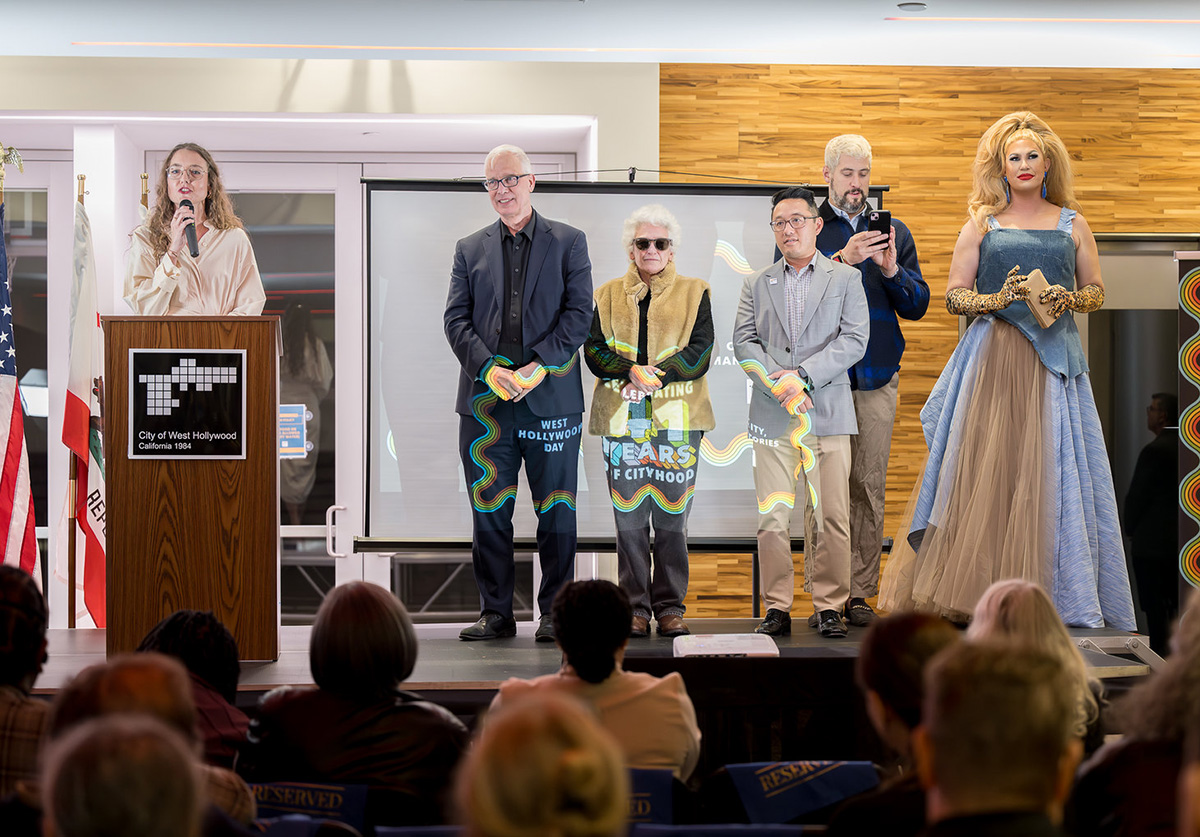
On Nov. 29th, 1984, West Hollywood was incorporated as an independent City, making its sovereignty official and solidifying it further as a sanctuary for LGBTQ+ community members, their stories, and their freedoms. Inspired by other prominent gay neighborhoods like New York’s West Village and San Francisco’s Castro District, West Hollywood was established by local queer advocates and residents. Their first city council was made up of a majority gay governing body — the first in the world, according to the West Hollywood History Center.
This political legacy, and the city’s vibrant and proudly queer history, continues to be preserved. On Monday’s celebratory event, West Hollywood mayor Chelsea Byers announced that the City’s current council “continues to be a majority-LGBTQ+ body,” holding tightly onto a “spirit” that reflects, prioritizes, and fights for Los Angeles’ queer community.
West Hollywood has been through various transformations, cocooning and revitalizing itself through the country’s evolving political and cultural upheavals. It has long been home to a ravishing nightlife that celebrates LGBTQ+ expression, and was a focal point for queer-led liberation and activism in the late 1960s and early 1970s. Trailblazers like Morris Kight led the first gay pride march through West Hollywood’s streets in 1970 and opened the Los Angeles LGBT Center to nourish the City’s robust and blossoming queer communities.
Today, West Hollywood continues to be the place where queer organizers and residents plant roots. Earlier this month, STORIES: the AIDS monument opened up in the City’s park after over a decade of work, shining a light on the legacies of gay activists, artists, historians, and community members who fought to survive as anti-gay stigma led to the erasure of their rights and lives.
As waves of anti-LGBTQ+ hate and violence continue to surge through the country, West Hollywood elected officials aim to continue doing the critical work that began decades before them: the work that protects the ability of queer residents to advocate for themselves, to live with protections and dignity, and to relish in joy. Mayor Byers is inspired by the resilience of the community members who stood together to establish this independent City in 1984. “The people who lived here…wanted a city with strong protections for renters, with progressive policies, and with a local government that would actually reflect and protect the people who call this place home,” said Byers, at the Nov. 24th celebration.
Over 40 years later, these needs have not changed. The way forward? Remembering and fighting for that initial promise and hope. “We are a chorus. We are a tapestry,” said Byers. “We are the product of thousands of people who, for more than four decades, have dared to say: We can build something better here.”
Kristie Song is a California Local News Fellow placed with the Los Angeles Blade. The California Local News Fellowship is a state-funded initiative to support and strengthen local news reporting. Learn more about it at fellowships.journalism.berkeley.edu/cafellows.
West Hollywood
From nickname to reality, the Rainbow District is made official by the City of West Hollywood
The mile along Santa Monica Boulevard from N. Doheny Drive to N. La Cienega Boulevard welcomes residents and visitors to come as they are
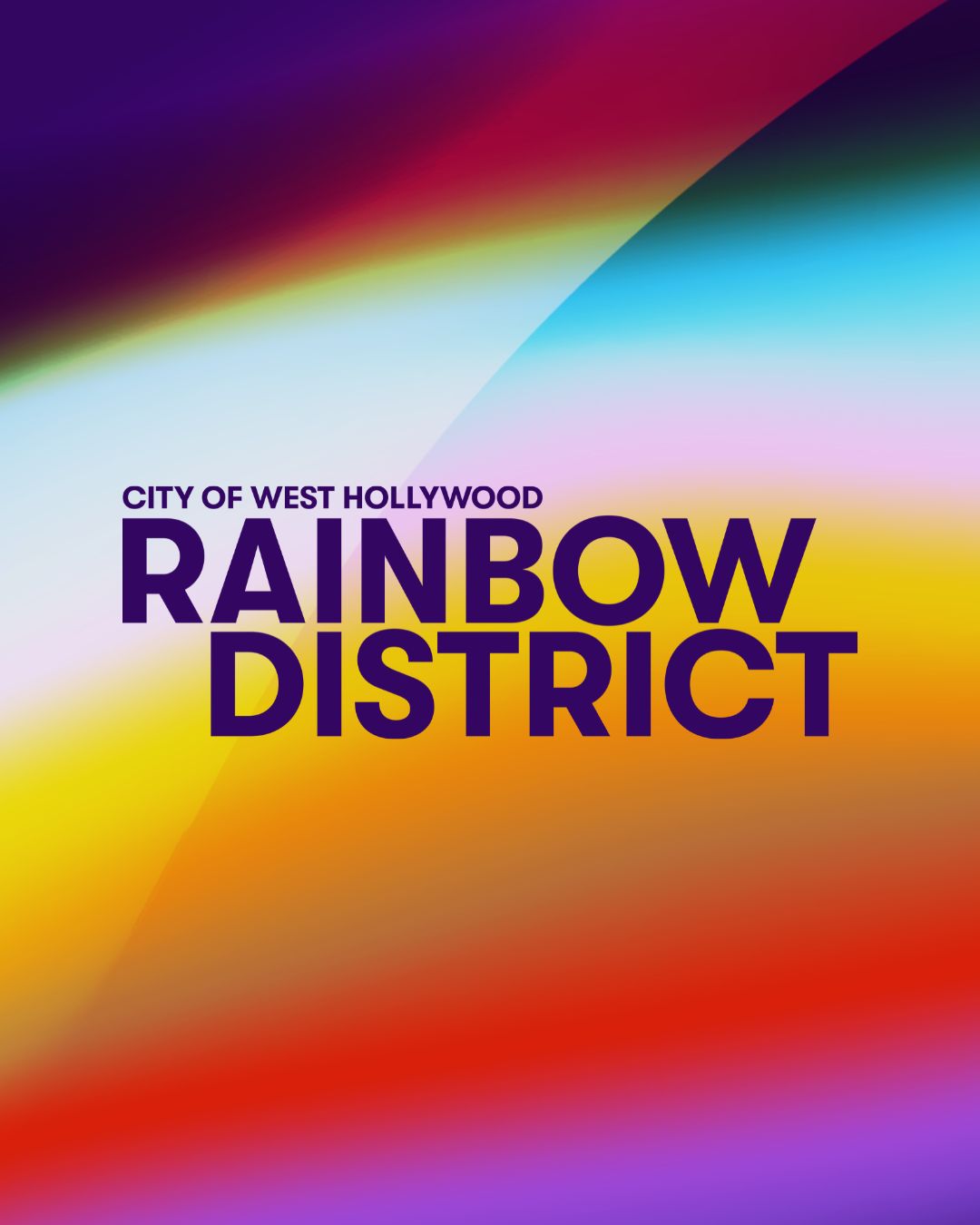
Even in today’s political climate, we will not be hidden.
The vibrant stretch on Santa Monica Blvd of over 50 local businesses, representing the full spectrum of LGBTQ+ expression, from N Doheny Dr to N La Cienega, has had the loving nickname of the Rainbow District for decades. Well, now it’s official. From nightlife to restaurants to community organizations, the City of West Hollywood has formally designated the space as such, honoring the neighborhood’s legacy as a safe haven for the queer community and beyond.
In addition to making the name official, the Rainbow District is being launched with a full range of social media, including Instagram, TikTok, and Facebook, keeping the residents and visitors updated on all upcoming events and happenings in the neighborhood.
Long known as a beacon of acceptance, inclusion, and visibility, where everyone is welcome, this iconic mile-long corridor is now formally recognized for what it has always been: a place where people from every walk of life can come together, be themselves, and celebrate the beauty of diversity.
City of West Hollywood Mayor Chelsea Lee Byers states, “For generations, the City of West Hollywood’s Rainbow District has been a place where LGBTQ+ people take their first steps into living openly, where the warm embrace of community is found at every turn, and where the joy of living out, loud, and proud fills the streets. The City’s official designation of the Rainbow District honors both the legacy and the future of this vibrant neighborhood, home to beloved entertainment venues, bars, and restaurants that have long served as cornerstones of LGBTQ+ life. Today, the Rainbow District is more alive than ever, and it will always stand as a beacon of hope, pride, and belonging and as a reminder that everyone deserves a place to celebrate joy, to be seen, and to be supported.”
The Rainbow District officially joins a nationwide list of iconic LGBTQ+ landmarks. West Hollywood will not be hidden amid political backlash and will continue to protect queer spaces, uplift queer voices, and foster a safe and joyful environment for all.
“This designation is not only a celebration, but it also serves as a promise,” said Visit West Hollywood President & CEO Tom Kiely. “A promise to keep LGBTQ+ spaces visible, valued, and vibrant for generations to come. As the Rainbow District continues to evolve, it will remain a place where locals and visitors alike can connect through culture, creativity, and community. The City’s formal designation affirms its significance and highlights The Rainbow District as the ultimate playground for travelers seeking a unique, inclusive, and authentic experience.”
The Rainbow District will be home to upcoming community events that include:
- Winter Market & Ice Skating Rink — December 2025
- Go-Go Dancer Appreciation Day — March 2026
- Harvey Milk Day — May 22, 2026
- WeHo Pride Weekend & the OUTLOUD Music Festival at WeHo Pride — June 5–7, 2026
Follow the Rainbow District on socials to discover local happenings, support small businesses, and be part of a neighborhood that celebrates every person for exactly who they are.
Instagram: @RainbowDistrictWeHo TikTok: @RainbowDistrictWeHo
Facebook: facebook.com/rainbowdistrictweho More Info: visitwesthollywood.com/rainbowdistrict
West Hollywood
West Hollywood’s AIDS Monument preserves the pain and power of people lost to the crisis
STORIES: The AIDS Monument is now available to view at West Hollywood Park, 15 years after its conception.
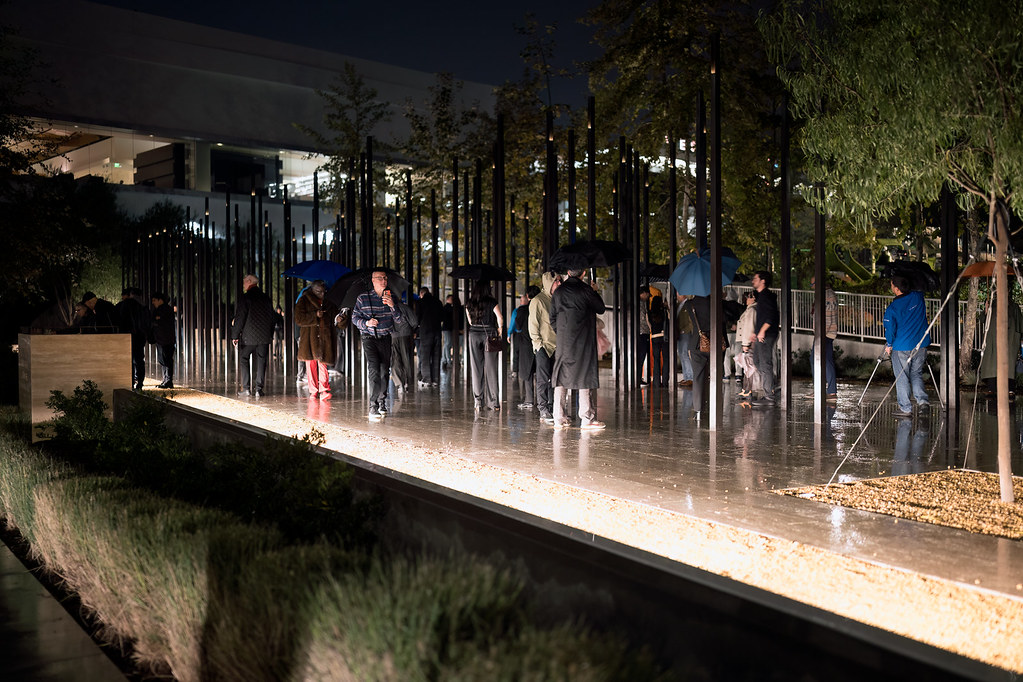
It was 1985, at the height of the AIDS crisis, when Irwin Rappaport came out as gay. As he came to terms with his identity, he witnessed people around him grow weaker: their faces becoming gaunt, painful lesions developing on their bodies. Five years later, he began volunteering as a young lawyer at the Whitman-Walker Clinic, a community health hotspot in Washington, D.C. that created the first AIDS hotline in the city, opened homes for patients with AIDS, and distributed materials that promoted safe sex.
The work being done at the clinic was instrumental, essential, and deeply painful. “When you see that sickness and experience that death among your friends and people you know, and when you’re writing wills for people who are much too young in ordinary times — it has an impact,” Rappaport told the Blade. “And even though in 1996 we saw life-saving medications come around, you never forget the sense of fear that permeates your life. The sense of loss.”
Determined to honor and share the legacies of people who died from AIDS, Rappaport joined the Foundation for the AIDS Monument (FAM) board to work towards the organization’s goal of creating a physical monument dedicated to memorializing these histories. FAM treasurer Craig Dougherty first conceived of this project in 2010 and, after 15 years, STORIES: The AIDS Monument is now available to the public for viewing.
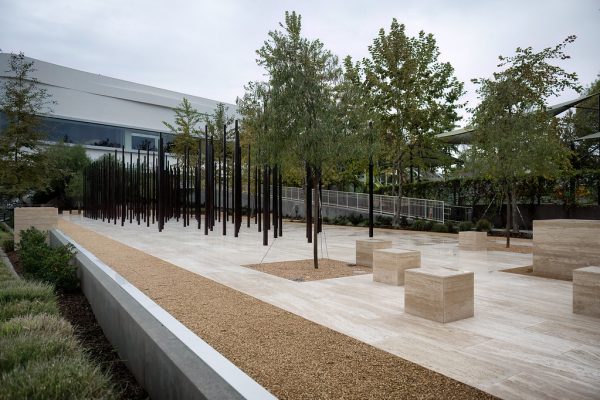
Created in collaboration with the City of West Hollywood, STORIES: The AIDS Monument is composed of 147 vertical bronze pillars known as “traces.” Designed by artist Daniel Tobin, 30 of these traces are engraved with words like: activism, isolation, compassion, and loss, which correlate to the over 125 audio stories collected and archived on the foundation’s website. This multimodal storytelling allows people who come across the monument to engage more intimately with the people represented by these physical pillars.
At nighttime, lights transform the monument into a candlelight vigil, providing a warm glow to a wanderer’s journey through the structure.
When people were able to walk around the traces at Sunday’s grand opening ceremony at the Pacific Design Center, the last remnants of the weekend’s rainstorm created a kind of “spiritual” and reverent atmosphere for those gathering, according to Rappaport. “I think there’s a certain peacefulness and serenity about the design, an opportunity for reflection,” he continued. “For some, it may bring back incredibly painful memories. It might bring back wonderful times with friends who are no longer here. It might remind them of their own caregiving or activism, or the sense of community that they felt in striving with others to get more attention to the disease.”
Now that the monument has been built, FAM has passed the mantle of management and programming to One Institute, a nonprofit that engages community members with queer history through panels, screenings, and other educational initiatives. One Institute plans to host monthly docent tours, art installations, and other special events during various LGBTQ+ national awareness days, including the upcoming World AIDS Day in December.
Rappaport also hopes to do outreach with local schools, so that young students are able to engage with the monument, learn about the people who were affected by the AIDS crisis, and interact with the ripples of transformation that this time period sparked in politics, research, the arts, and within society. “For younger people, I think [this is] an invitation for them to understand how they can organize about issues that they care about,” Rappaport said. “[So] they can see what the HIV and AIDS community did as a model for what they can do to organize and change the world, change culture, change law, change politics, change whatever they think needs to be changed. Because we had no other choice, right?”
West Hollywood
West Hollywood invests $1 million to build LGBTQ+ Olympic hospitality house
Pride House LA/WeHo will be an interactive space for queer athletes and allies to celebrate the 2028 Summer Games together.
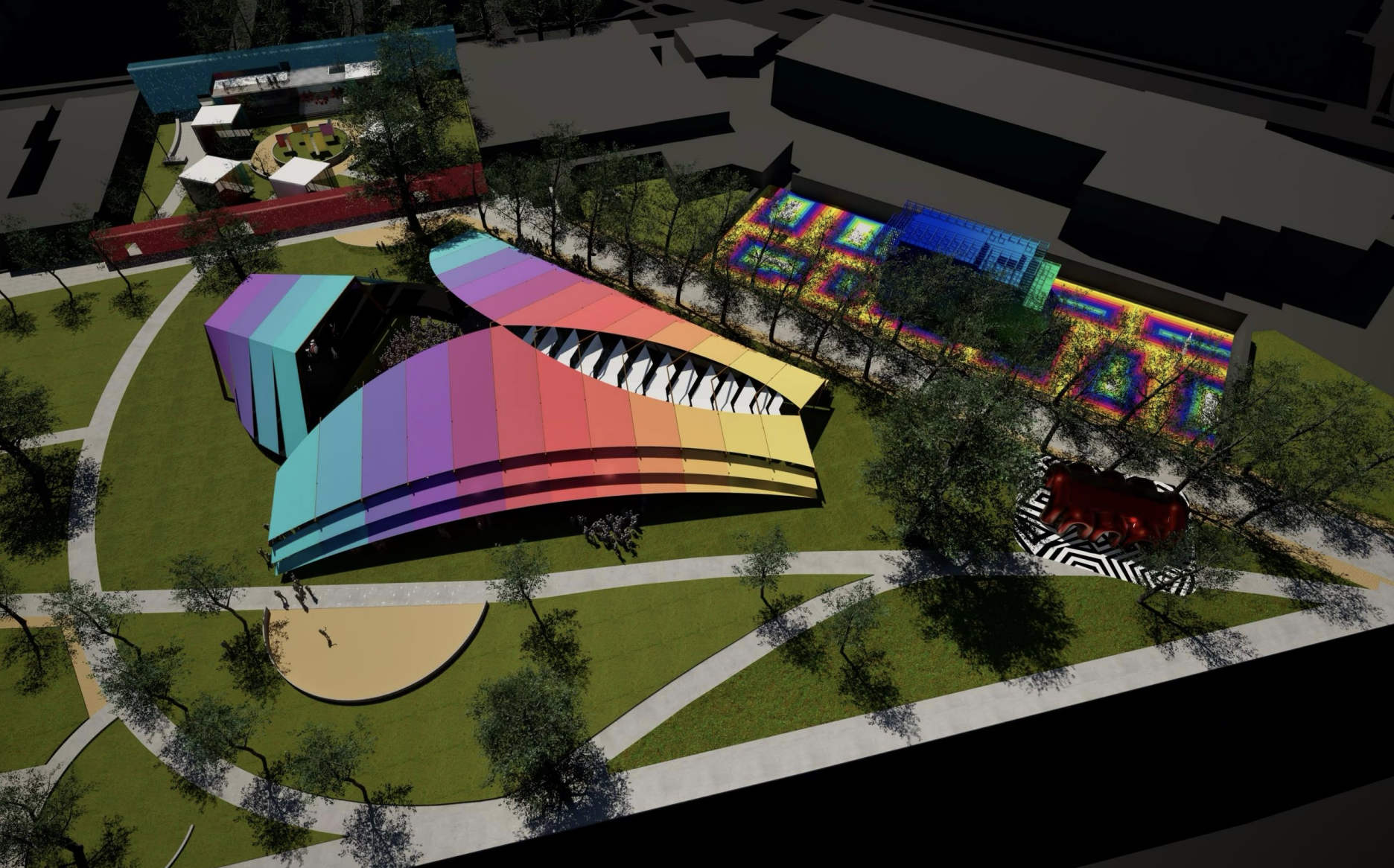
The first-ever Olympic hospitality house began with humble roots in 1992: a tent pitched on the Port of Barcelona for athletes to gather with their families. Since then, they transformed into fixtures of several major sporting events, with hopes of fostering belonging and safety for athletes of various cultural backgrounds.
It wasn’t until 2010 that the first LGBTQ+ hospitality house, the Pride House, appeared during the Winter Olympics in Vancouver. Over the years, its existence and visibility have faced barriers. During the 2014 Sochi Winter Olympic Games in Russia, Pride House International was denied from organizing its safe hub. The rejection was a blow to the visibility and safety that the organization was trying to promote and create for queer athletes. But this didn’t go unnoticed. International fans demonstrated quiet resistance, hosting remote Pride Houses in support of the Olympians who were barred from openly communing and celebrating together.
As Los Angeles prepares to host the Summer Olympics in July 2028, Pride House is coming back stronger than ever. In early October, the West Hollywood city council approved an agreement that would allocate $1 million to sponsor Pride House LA/WeHo as they prepare to build a temporary structure at West Hollywood Park for the 2028 Games. For 17 days, vibrant LGBTQ+ sports programming will fill the park’s grassy knolls.
Pride House LA/WeHo CEO Michael Ferrera detailed at a Nov. 1st Out Athlete Fund fundraising event that the team plans to build a concert stage to seat over 6,000 people. There will also be a museum that will take viewers through 100 years of queer Olympics history, viewing areas for people to watch the games, and a private athlete village for queer Olympians. “The dream of that is — imagine you’re an athlete from a country where you can’t be out,” said Ferrera. “You come here, and you can be safe and sound.”
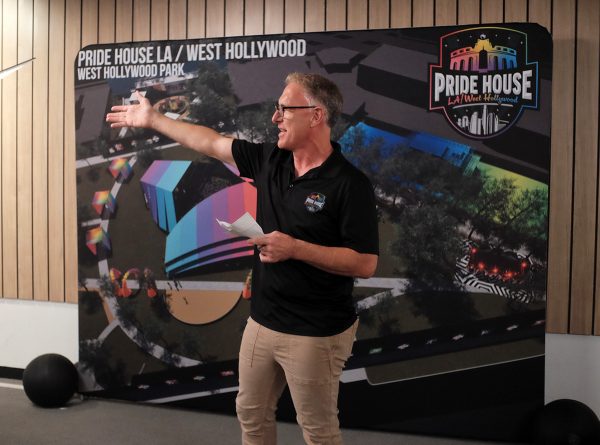
As outlined in the city council agreement and stated by Ferrera, most of the programming will be free and open to the public, and in the heart of a neighborhood that many of the county’s queer residents recognize as their safe haven. “We’re centering this important event in West Hollywood Park where our community has come together for decades in celebration, in protest, to support each other and to live our lives,” Pride House LA/WeHo CEO Michael Ferrera wrote to the Blade. “There is no place that is more representative of inclusion and safe spaces.”
The City of West Hollywood is promoting this inclusion further by asking for local community members to voice their perspectives on the formation of Pride House LA/WeHo at West Hollywood Park. On Monday, a community conversation will take place at Plummer Park to encourage residents to help shape the cultural programming that will take place in the summer of 2028. Another conversation will take place on Nov. 21st at the City’s 40th anniversary of Cityhood event.
“We couldn’t do this without the generosity and partnership of the city of West Hollywood,” Pride House LA/WeHo marketing co-lead Haley Caruso wrote to the Blade. “We are so happy to help bring the Olympic spirit to West Hollywood while also providing the community a safe and entertaining venue to enjoy the Games.”
Head to PrideHouseLAWeho.org for more information
West Hollywood
Drag performers delight Carnaval crowds with demure and daring dances
The Halloween party is one of the most anticipated events for queer Angelenos.
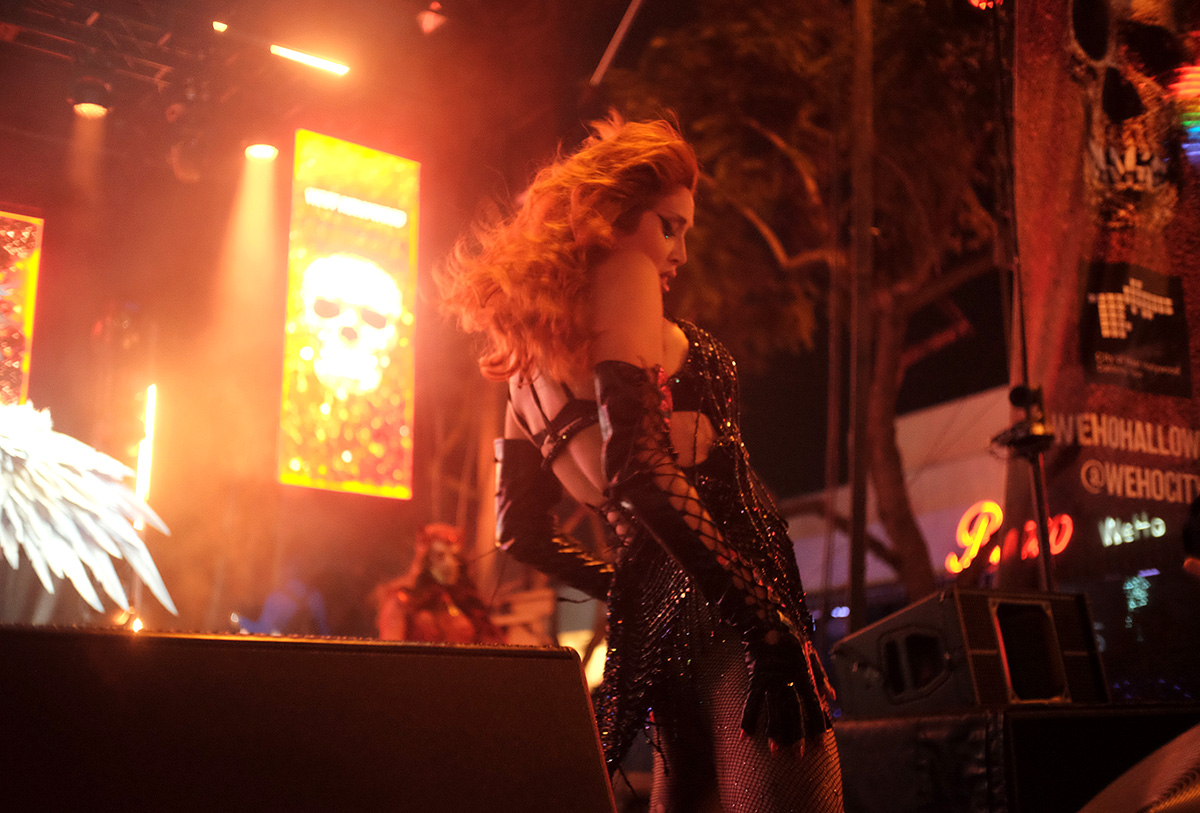
On Friday night, techno pop remixes surged through a tight block on Santa Monica Boulevard, where hundreds of eager partygoers danced near a pop-up stage. Bass-heavy grooves echoed across neighboring streets as Beetlejuices, angels, and vampires swayed and thumped to the beat.
Oct. 31 marked the arrival of West Hollywood’s annual Halloween Carnaval, one of the county’s citywide celebrations — and one of the most anticipated for queer Angelenos.
The first Halloween Carnaval was celebrated in 1987, and has since become one of the most awaited nights for local queer celebration. Drag performers donning elaborate costumes and glamorous makeup set the stage ablaze as they strutted, flipped their hair and danced to the cheers of a crowd that grew enormously as the night went on. The energy was infectious, and the Los Angeles Blade was on the scene to photograph some of these moments.
Image captures by Blade reporter Kristie Song.
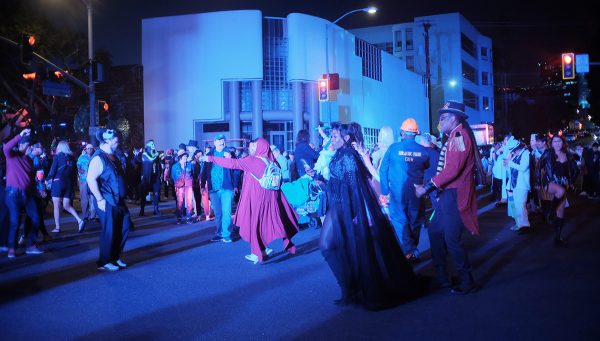

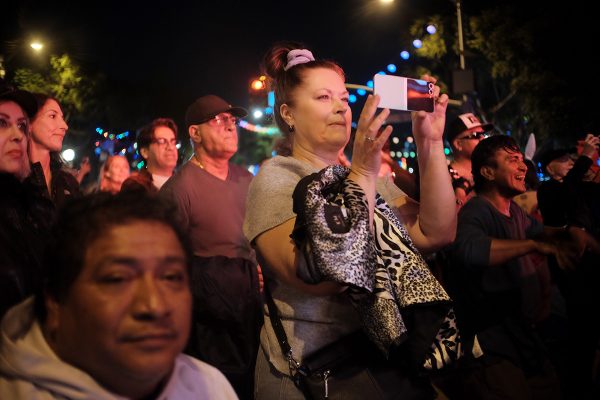
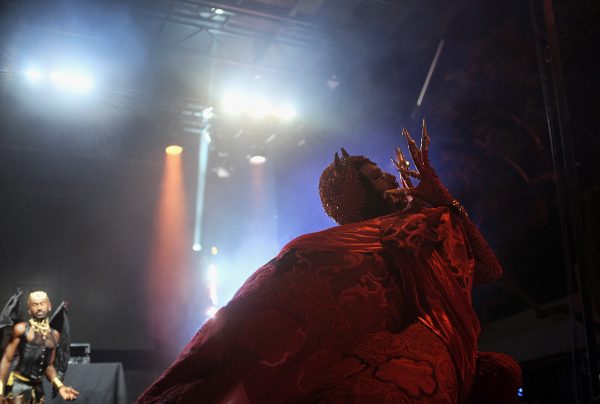
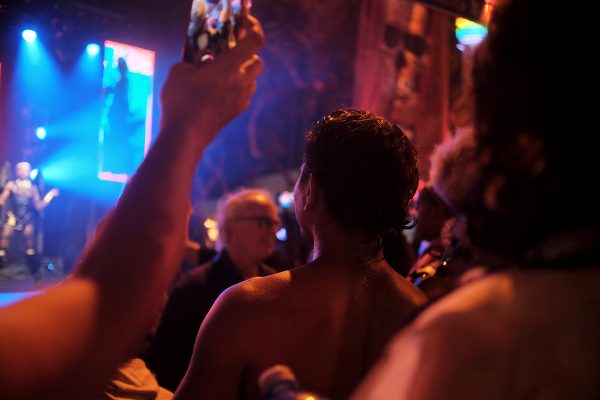
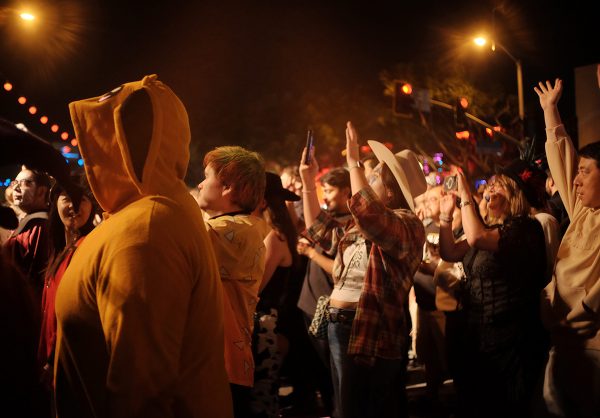
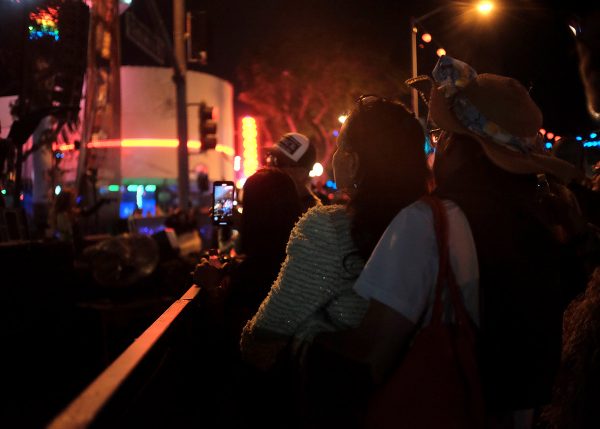
West Hollywood
West Hollywood installs new intersex pride flags on Intersex Awareness Day
On Sunday, city councilmembers gathered to raise two new pride flags to honor intersex community members
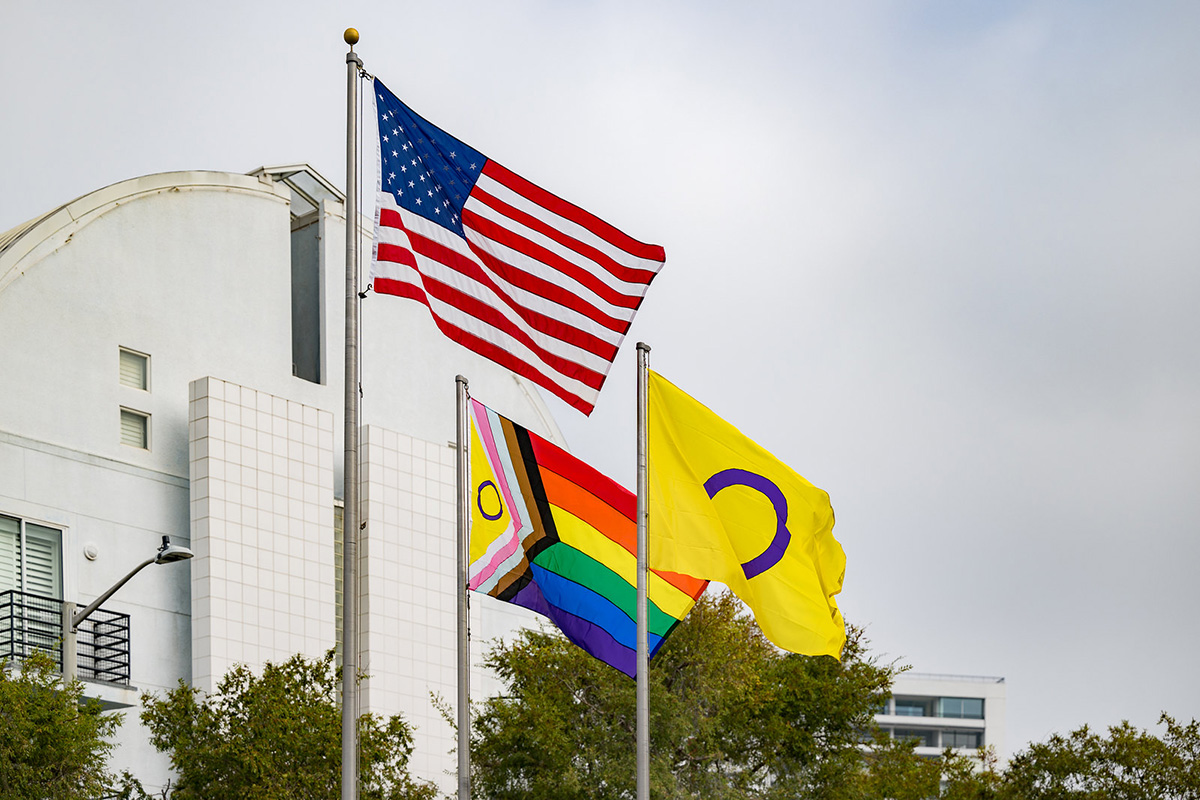
Early yesterday morning, on National Intersex Awareness Day, West Hollywood mayor Chelsea Byers, Vice Mayor John Heilman, as well as councilmembers Danny Hang and John M. Erickson gathered to install and raise two new intersex pride flags. They fly side by side with the American flag, upholding the City of West Hollywood’s vision of solidarity between national pride and LGBTQ+ visibility.
“We are facing unprecedented attacks on our community. It is important that we recognize the entirety of the LGBTQI+ community,” Vice Mayor John Heilman wrote to the Blade. “Intersex people have long been ignored and their issues disregarded. Raising the intersex flag also raises awareness about the challenges many intersex people face.”
Intersex people are born with naturally occurring variations in reproductive and sexual anatomy that don’t fit into binary “male” or “female” categorizations. As Planned Parenthood details, this can look like having both ovarian and testicular tissues or having combinations of chromosomes that aren’t “male” or “female,” just to name a few. According to the Human Rights Campaign Foundation, one of the biggest issues intersex people face is non-consensual surgeries performed when they are children. These operations are considered medically unnecessary and can leave lasting physical and psychological damage on intersex youth.
The fight for bodily autonomy and intersex visibility was the main reason behind the first action organized by intersex advocates and trans allies on Oct. 26th, 1996. Protestors stood outside the Boston Convention Centre, passed out leaflets, and spoke with clinicians, nurses, and other medical professionals attending the annual American Academy of Pediatrics conference.
One of the main leaders behind this movement was Morgan Holmes, an intersex woman who had experienced a violating medical procedure meant to “correct” her anatomy. In May of 1996, she presented testimony in a room adjacent to a symposium on genital surgery for intersex infants, a conference she and other members of her advocacy group had been rejected from.
“What I am saying is that my medical ‘care-givers’ failed to respect my autonomy or my intelligence when they assumed that because I was a child, they could do whatever they wanted as long as my father provided his consent,” Holmes said. “And when I began to balk, instead of questioning their own treatment of me, they blamed my body, and they cut it up.”
Today, intersex people and their stories are more broadly recognized, but still struggle to reach mainstream audiences when it comes to discussions around LGBTQ+ identity. West Hollywood city officials see this addition of intersex pride flags as a step forward. “Updating our city’s flags was my item because visibility matters,” councilmember John M. Erickson wrote to the Blade. “Intersex people have always been part of our story, and it’s time that their history, identity, and pride are recognized in the public spaces that belong to all of us.”
West Hollywood
Residents remain dubious as officials claim “no ICE involvement” at The Abbey
The Oct. 17th “undercover operation” was addressed at the latest city council meeting
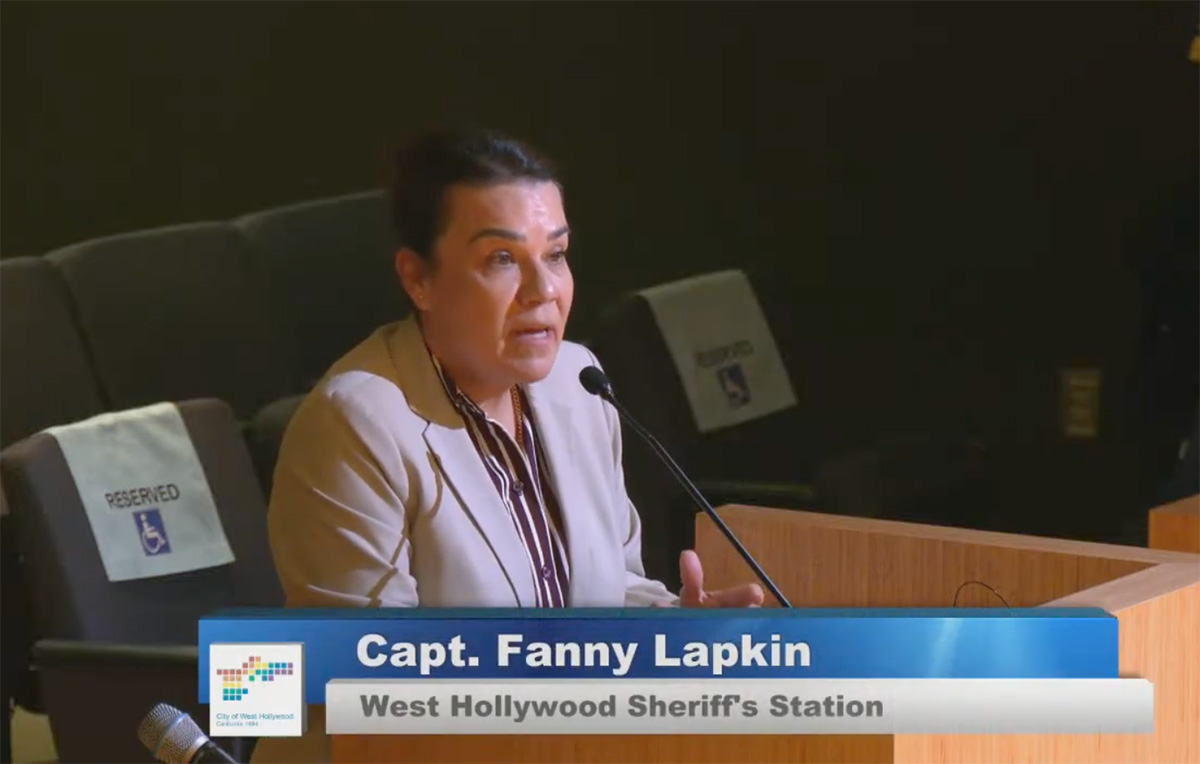
On Friday, Oct. 17th, West Hollywood gay bar The Abbey found itself in the center of a social media storm as clips were shared depicting the presumed presence of federal Immigration and Customs Enforcement (ICE) officers. In a video posted on Oct. 18th by Charles Hernandez, who often creates content around gay nightlife in Los Angeles, several people are seen standing in a line as they are apprehended and handcuffed by officers wearing sheriff’s vests and tees. Hernandez noted that, while dressed in varying attire with the word “sheriff” on it, none of the officers were willing to identify themselves or present their badges upon request.
Hernandez can be heard asking the officers about the cause for arrest, to which one responded: “I don’t have to tell you our cause.” The video creator also questioned another officer, who can be seen wearing a gaiter to cover his face. “Isn’t it illegal to wear a mask in California?” Hernandez asked. “He has COVID,” an officer replied. In September, Governor Newsom signed five bills that weakened federal agents’ abilities to access school sites and health facilities, and prohibited them from hiding their identities. More specifically, SB 627 requires all California law enforcement agencies to create written policies limiting their officers’ use of facial coverings by July 1, 2026.
As this video circulated around the web, the West Hollywood Sheriff’s Station released an online statement of their own, denying allegations that the officers present were federal immigration officers. The station also claimed that the night’s events were a result of an “undercover operation” that was conducted in response to reports made about pickpocketing and the transportation, use, and sale of illegal substances. “Several arrests were made,” the statement read. “ICE was not involved.”
Still, residents remained unconvinced, criticizing the station’s lack of transparency, careful conduct, and accountability. Over 50 people took to the comments of this statement to voice their discontent. “[It] was not that long ago when officers would raid LGBTQ spaces and arrest people simply for being there,” one comment read. “A raid such as this does not inspire feelings of safety for our community. Especially in times when people are being kidnapped off the street by masked federal agents. There simply must be a better response to pickpockets and “other criminal activity” than undercover raids by masked officers and transporting detainees in unmarked vehicles. DO BETTER.”
Two days later, at the West Hollywood city council meeting, West Hollywood Sheriff’s Station Captain Fanny Lapkin took to the podium to address some of these concerns. Echoing the station’s Instagram statement, Lapkin confirmed that the “pre-planned operation” was created in response to “concerns from our businesses and our community in regards to the pickpocketing, to the narcotics, and also to the illegal vending and some of the criminal activity during illegal vending.” Lapkin also confirmed that no federal agents were present, stating that everyone who took part in the operation was “sheriff’s department personnel.” And because the arrests were made as part of a planned operation, Lapkin further stated that warrants were not “necessary.”
The events were discussed with brevity at the meeting, but community ire has not been dispelled. Several people continue to question the ethics of this undercover operation: Why were the individuals being arrested not clearly told the reason for their detainment? Why were unmarked vehicles present? Why conduct the operation in this way, as Los Angeles neighborhoods continue to stay on high alert over immigration raids? These questions remain unanswered as more specifics about the operation have yet to be released.
-

 Arts & Entertainment4 days ago
Arts & Entertainment4 days ago2026 Best of LGBTQ LA Finalist Voting
-

 Commentary4 days ago
Commentary4 days agoWhen optics matter more than harm: BAFTA, BBC, and editing solidarity while letting slurs slide on through
-

 California5 days ago
California5 days agoExperts discuss pathways forward as anti-trans violence continues to rise
-

 a&e features4 days ago
a&e features4 days agoRevry Co-Founder Damian Pelliccione on why we need ‘King of Drag’
-

 LGBTQ+ Youth Mental Health2 days ago
LGBTQ+ Youth Mental Health2 days agoFor queer youth, LGBTQ+ scholarships affirm their visibility and sense of possibility
-

 Books5 days ago
Books5 days agoNew book profiles LGBTQ+ Ukrainians, documents war experiences
-

 Books3 days ago
Books3 days agoThe social side of self-pleasure: Artist Jason Wimberly presents his newest book of photography, HOMOSOCIAL
-

 Obituary2 days ago
Obituary2 days agoAppreciating literature’s gay genius, Michael Silverblatt
-

 a&e features2 days ago
a&e features2 days agoTaylor Tookes wants you to be your own beauty standard
-

 Movies3 days ago
Movies3 days agoMoving doc ‘Come See Me’ is more than Oscar worthy



